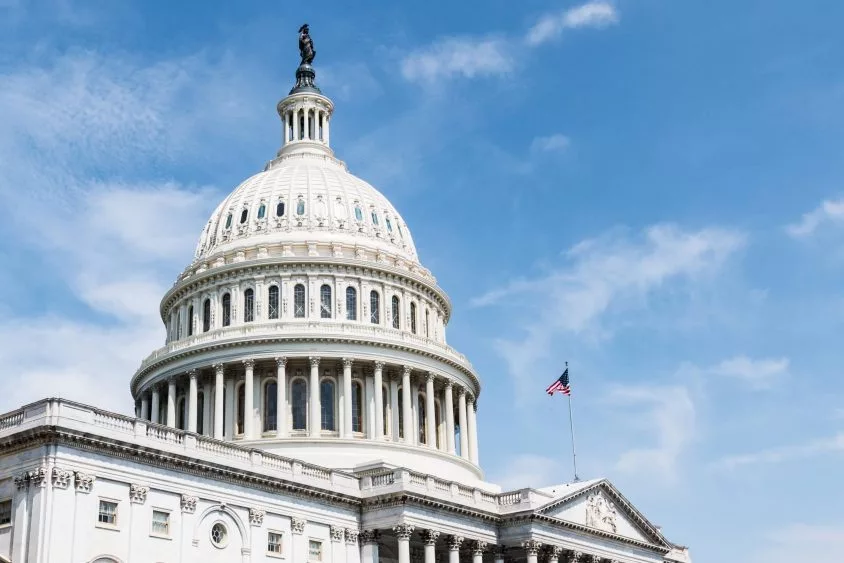
(WASHINGTON D.C.) — As the Senate continues their reconciliation process this week, multiple ag groups have applauded the provisions included by the Senate Agriculture Committee in their text to be included in the wider budget reconciliation package.
The American Soybean Association appreciates Chairman John Boozman’s efforts to include farm bill programs within the legislation that are key for ASA. “At a time of great uncertainty for the agriculture economy, ASA appreciates the committee’s continued efforts to support the needs of farmers,” Kentucky soybean grower and ASA President Caleb Ragland said. “While we continue to urge Congress to work toward passing a much-needed five-year farm bill this year, we are pleased to see the continued support from Congress.”
The budget reconciliation package marked up by Senate Ag contains several provisions ASA advocated for during farm bill negotiations during the last Congress. While budget reconciliation negotiations are far from finished, ASA is pleased the Senate Agriculture Committee is keeping farmer priorities top of mind as work continues to draft a comprehensive five-year farm bill.
The National Corn Growers Association released a statement saying corn growers were able to secure improvements compared to earlier versions of the legislation. “We are pleased to see that Chairman Boozman (R-Ark.) retained increased investment in agricultural trade promotion programs and made additional improvements to the commodity programs, including removing the proposed corn price floor for the Price Loss Coverage program,” said NCGA President Kenneth Hartman Jr. “Though several crucial steps remain in the Senate’s process for completing budget reconciliation, and this is not the process that we would have chosen, we want to recognize the Senate Agriculture Committee leadership for its response to corn growers’ concerns.”
The National Sorghum Producers (NSP) appreciates the Senate Committee on Agriculture, Nutrition and Forestry’s inclusion of key farm safety net provisions in its reconciliation package and welcomes the continued focus on strengthening farm policy for U.S. agricultural producers.
“Sorghum producers rely on practical, effective policy to remain competitive in an increasingly volatile global market,” said NSP Chair Amy France, a farmer from Scott City, Kan. “The Senate’s proposal, much like the House version, makes significant steps in the right direction by extending key risk management tools, increasing reference prices and continuing vital investments in conservation initiatives and biofuel programs.”
NSP applauds Chairman John Boozman’s (R-Ark.) inclusion of key provisions, including the extension and enhancement of PLC and ARC through 2031. The package also improves ARC’s payment calculations, enhances access and affordability for crop insurance and increases funding for trade promotion and agricultural research — all crucial priorities for U.S. sorghum producers.
“These updates are not just welcome, they’re necessary,” France said. “Producers are facing tight margins and ongoing uncertainty. Improving farm safety net tools while committing resources to expanding export markets gives farmers the stability needed to encourage continued investment in their operations and rural communities.”
The National Cotton Council applauds the legislative text as well. “This proposal is a crucial step towards ensuring fiscal responsibility and making vital investments in rural America and our farm families,” said NCC Chairman Patrick Johnson, a producer from Tunica, MS. “By making significant improvements in the safety net, this legislation supports the ongoing production of safe, affordable, and plentiful food, fuel, and fiber, which are fundamental to our nation’s economy and the health of our communities.”
The NCC strongly urges the committee to advance the bill. “Looking ahead, our industry is committed to working closely with the House and Senate leadership to secure the bill’s final approval. For our producers, the stakes are high—it’s not just about financial losses this year, but the risk of losing their entire farms,” said Johnson.
Specialty crop groups also welcomed the Senate Agriculture Committee text, including the National Potato Council.
“The provisions supporting specialty crop growers are not merely beneficial – they are essential for the survival and international competitiveness of our family farms and the entire U.S. potato industry,” said NPC President Ted Tschirky, potato grower from Washington state. “We appreciate Chairman Boozman for demonstrating a clear commitment to improving the challenging economic landscape faced by our nation’s farmers.”
Those specialty crop funding enhancements funded in the draft include:
- Specialty Crop Research Initiative: $175 million per year (an increase from $80 million)
- Specialty Crop Block Grant Program: $100 million per year (and increase from $85 million)
- Adjusted Gross Income: The limitation is eliminated if 75% or more income is derived from farming
- Market Access Program: $200 million (a 100% increase)
- Section 7721 – Pest and Disease programs under Plant Protection Act: $90 million per year (an increase from $75 million)
“America’s family potato farms have endured significant competitive challenges since the 2018 Farm Bill was passed, and those growers have been waiting for modernized tools since that bill originally expired. Senator Boozman’s specialty crop provisions address that need, and they must be urgently passed by Congress, signed by the President, and enacted into law through any viable legislative vehicle,” said NPC CEO Kam Quarles.
The Specialty Crop Farm Bill Alliance (SCFBA) issued the following statement saying in part that “We are grateful to Chairman Boozman and his staff for advancing these vital investments in specialty crops that the Specialty Crop Farm Bill Alliance has been proposing since 2023.”
They continued saying “Our message today is simple: any Congressional investment in American agriculture must include specialty crops. America’s specialty crop growers confront a host of unprecedented challenges. Rising input costs, limited access to labor, unfair trade practices, disruptions to foreign markets, and natural disasters ranging from flood to drought all impede the competitiveness of these family farms. Nothing short of the survival of our domestic industry is at stake.”



